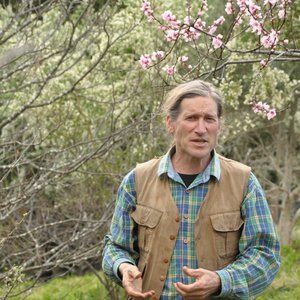This post is a continuation of my series discussing David Holmgren’s Crash On Demand essay, and the multitude of responses that have popped up in the peak oil blogosphere.
One of those responses was by Nicole Foss, of The Automatic Earth. In fact her response was a long essay in its own right, which deserves to be read in its entirety: Crash on Demand? A Response to David Holmgren. In the middle of this long essay, Nicole Foss has a section that I’d like to quote at length. One of the unfortunate outcomes of long essays is that important ideas can get lost, and I want this to see the light of day.
I have previously pointed out (here and here) that David Holmgren was not directly advocating that people engage in activities for the purpose of crashing the economy. Rather he was appealing to those who do think that such an approach is appropriate – suggesting that the permaculture approach of withdrawing from the consumer economy and becoming more self-reliant might actually contribute more effectively to the end result of creating the kind of world we do want to live in, AND might also, by the way, hasten the crashing of the current economic system. In a recent interview, Holmgren stated: “…some people thought I was advocating that the primary motivation for the sort of Permaculture strategies was actually to destroy the current economy. That’s not the purpose at all, but it’s a bizarre situation that we’ve got to, where the possibility of the success of that strategy would hasten what is an inevitable process, because generally the view is that these personal things that we do don’t really have any impact.”
Nevertheless, I think it is important to address this question – should we engage in deliberate attempts to bring the system down? I personally do not feel this to be a strategy that would be effective in the long term. This is a message I have tried to put out numerous times (for example here and here and here and here), but I think Nicole Foss says it better than I have ever been able to articulate. Perhaps she does not fully grasp the subtleties of Holmgren’s position that I’ve outlined above, but I appreciate the clarity of her own position. I am quoting at length to provide context – the important points I want to focus on are in the last three paragraphs:
Holmgren argues that collapse in fact offers the best way forward, that a reckoning postponed will be worse when the inevitable limit is finally reached. The longer the expansion phase of the cycle continues, the greater the debt mountain and the structural dependence on cheap energy become, and the more greenhouse gas emissions are produced. Considerable pain is inflicted on the masses by the attempt to sustain the unsustainable at any cost. If we need to learn to live within limits, we should do so sooner rather than later. Holmgren focuses particularly on the potential for collapse to sharply reduce emissions, thereby perhaps preventing the climate catastrophe built into the Brown Tech scenario.
He raises the possibility that concerted effort by a large enough minority of middle class westerners to convert from dependent consumers to independent producers could derail an already over-stretched and vulnerable financial system which requires perpetual growth to survive. He suggests that a 50% reduction in consumption and a 50% conversion of assets into building resilience by 10% of the population of developed countries would create a 5% reduction in demand and savings capital available for banks to lend.
An involuntary demand collapse is, in any case, characteristic of periods of economic depression. Conversion of assets from the virtual wealth of the financial world to something tangible would have to be done well in advance of financial crisis, as the value of purely financial assets is likely to evaporate in a large scale repricing event, leaving nothing to convert. There are far more financial assets that constitute claims to underlying real wealth than there is real wealth to be claimed, and only the early movers will be able to make a claim. This is already well underway among the elite who are aware that financial crisis is approaching. In a world where banks create money as debt at the stroke of a pen, a pool of savings is not actually necessary for lending. Lending rests to a much greater extent on the perception of risk in the financial system. The impacts of proposed actions would not be linear, as the financial system is not mechanistic, meaning that quantitative outcomes would not necessarily be predictable. Holmgren recognizes this in his acknowledgement that small changes in the balance of supply and demand can have a disproportionate impact on prices.
Holmgren realizes the risks inherent in explicitly advocating such an approach, both at a personal level and in terms of the permaculture movement as a whole. These concerns are very valid. Permaculture has a very positive image as a solution to the need for perpetual growth, and this might be put at risk if it became associated with any deliberate attempt to cause system failure. While I understand why Holmgren would open a discussion on this front, given what is at stake, it is indeed dangerous to ‘grasp the third rail’ in this way. This approach has some aspects in common with Deep Green Resistance, which also advocates bringing down the existing system, although in their case in a more overtly destructive manner. In a command economy scenario, which seems at least temporarily likely, such explicitly stated goals become the focus, regardless of the least-worst-option rationale and the positive means by which the goals are meant to be pursued. A movement best placed to make a difference could find itself demonized and its practices uncomprehendingly banned, which would be simply tragic.
Decentralization initiatives already face opposition, but this could become significantly worse if perceived to be even more of a direct threat to the establishment. While they hold the potential to render people who disengage from the larger system very much better off, on the grounds of increased self-reliance, they also hold the potential to make targets of the early adopters who would be required to lead the charge. Much better, in my opinion, to continue the good work with the declared, and entirely defensible, goals of building greater local resilience and security of supply while preserving and regenerating the natural world. While almost any form of advance preparation for a major crisis of civilization would have the side-effect of weakening an existing system that increasingly requires total buy-in, there is a difference between side-effect and stated goal.
The global financial system is teetering on the brink of a major crisis in any case. It does not need any action taken to bring it down as it has already had easily enough rope to hang itself. Inviting blame for an inevitable outcome seems somewhat reckless given the likelihood that many will be casting about for scapegoats. Holmgren argues that, as those who warn of a crash are likely to be blamed for causing it anyway, they might as well be proactive about it. Personally, I would rather not provide a convenient justification for misplaced blame.
– Nicole Foss: Crash on Demand? A Response to David Holmgren
Please read her complete essay here.
 Enantiodromia has been identified by PatternDynamics as a common system pattern. The term was invented by Carl Jung who observed that “the superabundance of any force inevitably produces its opposite.” In PatternDynamics it is described as “the force exerted by extreme movements on the emergence and growth of their opposites.” The extreme conditions brought about by climate change impacts can spur some groups of people to develop an extreme response, which will likely result in an even more extreme response by opposing groups. For an extreme example, imagine an activist blowing up train tracks in order to stop coal trains from delivering their cargo to an export terminal. The likely result would be a swing in public opinion in support of both the railroad and the export terminal. Most people would not be able to identify with that level of violence, and so would tend to identify with its opposite. As the Bible says, Sow the wind, reap the whirlwind.
Enantiodromia has been identified by PatternDynamics as a common system pattern. The term was invented by Carl Jung who observed that “the superabundance of any force inevitably produces its opposite.” In PatternDynamics it is described as “the force exerted by extreme movements on the emergence and growth of their opposites.” The extreme conditions brought about by climate change impacts can spur some groups of people to develop an extreme response, which will likely result in an even more extreme response by opposing groups. For an extreme example, imagine an activist blowing up train tracks in order to stop coal trains from delivering their cargo to an export terminal. The likely result would be a swing in public opinion in support of both the railroad and the export terminal. Most people would not be able to identify with that level of violence, and so would tend to identify with its opposite. As the Bible says, Sow the wind, reap the whirlwind.
Although I thought Rob Hopkins’ response to the Holmgren essay was somewhat off the mark in its interpretation of Holmgren’s essay, he had an important point along these lines as well: “be careful what you wish for.” The Transition approach is still, for me, one that holds a lot of potential. The scale of changes needed calls for larger segments of society to come on board. The Transition Principle of Inclusion and Openness states, ““Successful Transition Initiatives need an unprecedented coming together of the broad diversity of society.” Hopkins’ follow-up piece, Reflections on Being a Cultural Optimist, is for me a stronger contribution to the Crash on Demand discussion. He writes:
Transition, for me, is in part about withdrawing our support from the existing, climate-destroying, fossil fuel-hungry beast, and transferring it to a new culture, a new economy, a new society. It’s divestment writ large. As Lipkis put it,
“I think we’ve been trained to spend time on these battles, on the negativity, and we lose people. We’ve lost precious decades. The crash is on its way. We don’t have to do anything. We need the time to convert people and move people. From the experience of those of us who went through the ‘60s and ‘70s in protest movements, I don’t think that route’s going to succeed. If we focus on that our best leaders are going to end up in jail for too long.”
That’s why Transition, for me, is skilful. It works at the local level, it is apolitical and therefore works beneath the radar, and it has the power to make what currently seems politically impossible become politically inevitable.
In my own “Integral Permaculture” approach, I have a high level of concern about the perilous state of the planet, and so I resonate with the concern and frustration of those who want to stop the destruction by any means necessary. However, like Hopkins and Foss, I believe positive actions are more effective strategies. The system is more likely to change course when a new and better paradigm is demonstrated. It is in this spirit that we strive for positive actions with both immediate and long term benefits.
The “us vs. them” approach is not working. We’re all in this together now.









